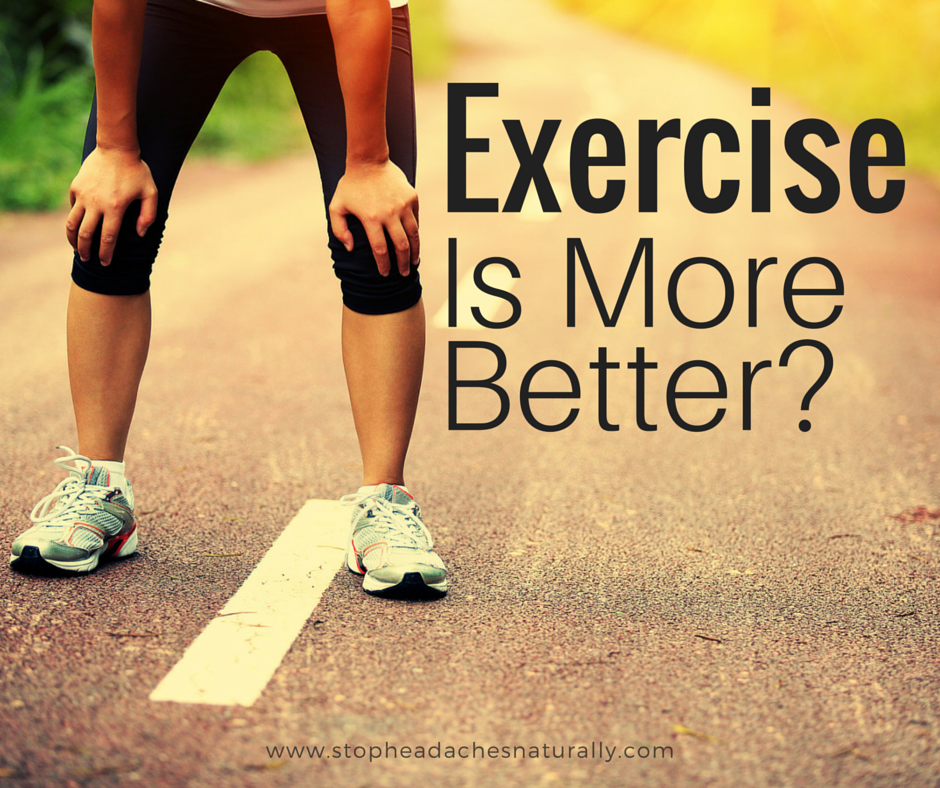Exercise - Is More Better?

A new study published in Current Biology found that people who exercise a lot don’t burn extra calories for their efforts beyond a certain point.
Now that doesn’t mean you stop exercising but it does shed some light on the misconception that more is better.
Read this interesting WebMD Heath News article and find out:
- What did the study find?
- The role of exercise in weight loss
- Why is it that more exercise is not better?
- Do we hit a kind of plateau?
- How do you find your ’sweet spot’?
- What’s the best take-home advice from this research?
Don’t Let Your Thirst Dictate Your Water Intake

Dehydration may seem a mild problem but even at a moderate level it can cause a lot of distress to an otherwise healthy person - if the problem is severe, it can even become life threatening. Our body is about 70% water and any decrease in this level can lead to many uncomfortable ailments including headache and migraines. So if you suffer from such complaints, it is important to keep your body well hydrated.
What is dehydration?
Dehydration is basically a deficiency of water in our body. In order for our body to function optimally, the balance between electrolytes and water needs to remain normal. When this balance is disrupted, we suffer from a number of physical symptoms that are collectively known as dehydration.
Common symptoms of dehydration
Following are a few of the most striking symptoms of dehydration:
• Headache
• Excessive thirst
• Dryness of mouth
• Dry, wrinkled skin with decreased elasticity
• Fatigue and weakness
• Muscle pain
Relation between dehydration and headache
The reason behind this is not clear but some studies have shown that it is due to the constricted blood vessels in the head that are trying to regulate the fluid levels and conserve water. This creates a deficiency of blood supply and therefore oxygen to the brain, creating a headache.
Dehydration can cause headaches and even trigger a migraine attack. The amount of pain may vary from person to person. It can be felt either in the front or back of the head or only on one side. There are some people who feel it throughout the entire head, mimicking a tension headache. A common symptom of a dehydration headache is increased pain with any head movement or walking.
Treating a dehydration headache
In order to treat a dehydration headache, you simply have to drink some water to rehydrate your body. It is best not to drink too fast. Instead, slowly drink 2-4 glasses of water and your headache will subside within a couple of hours. In some cases when you are unable to consume food or if a child is dehydrated, drink fluids that contain electrolytes such as a sports drink.
It is also important to rehydrate without sweating otherwise you will continue to lose fluids. So move to a cool environment or find some shade.
If the problem persists, it is best to consult a doctor who will prescribe I.V. fluids for faster recovery from dehydration.
Preventative measures
Drinking enough water throughout the day is the best way to prevent dehydration headaches. Although 6 - 8 glasses of water (1.5 - 2 litres) is considered ideal, this will vary according to your weight, physical activity and whether you live in a warmer climate or higher altitude.
Many people fall in the trap of never drinking enough water because they never feel thirsty - don’t let your thirst dictate your water intake. It is recommended to drink enough water so your urine is clear and a pale yellow colour.
Refrain from alcohol and excessive caffeine, because they act as a diuretic – leading to dehydration. Fruits and vegetables are great for health and energy but they are not a substitute for drinking water.
Image: spongysponge
________________________
Pablo Tymoszuk is a soft tissue therapist specialising in remedial, myofascial and dry needling techniques. He also acts as an ergonomic specialist and wellness consultant which has motivated him to co-author the eBook Stop Headaches Naturally.
Together with Dr Margaret Scarlett they present a range of strategies for stopping headaches and migraines without drugs. All strategies are organized in a systematic manner and backed up by references to the scientific literature.
Can You Exercise For Just 60 Seconds A Week & Transform Your Health?

There are many people who don't exercise because they believe they need to run or cycle hundreds of kilometres, bench press the weight of a car or have a personal trainer that pushes them to new levels to achieve their fitness goals... but that is not true!
Let me make myself clear, I support the personal training industry but not everyone responds to that sort of training.
I have always questioned excessive exercise due to the negative effects it has on the body. Yes, if you want to be on the front cover of Men's Health Magazine with 10% body fat or compete in next years Tour De France, your body will have to undergo serious training to achieve such feats.
On the other hand if your goal is to control your weight, increase your health and decrease the chances of illness or disease, then do you really need to train 4-6 days of week? All you need is a simple fitness program that develops your strength, flexibility and endurance.
High Intensity Training (HIT) has been used for many years. It is a great way to achieve your fitness goals without excessive exercise, reduce the incidence of overuse injuries and allow you to live a balanced life without the stress of meeting unrealistic fitness goals.
Here is an excerpt from Dr. Michael Mosley's (author of 2:5 Diet) Daily Mail article that explains the importance of exercise and the benefits of High Intensity Training...
"Everyone agrees that getting more active will add years to your life (around 2.2 years, to be exact).
But, more importantly, it will significantly reduce your risk of developing a range of chronic diseases, from cancer to heart failure, dementia to diabetes.
Exercise will also help you sleep better, improve your mood and even perk up your sex life, according to the well-regarded Mayo clinic in the U.S. (even help reduce tension headaches).
But how much should you do? In 2008, a committee of U.S. scientists recommended 150 minutes of moderate exercise a week, while cautioning the necessary amounts 'cannot yet be identified with a high degree of precision'. 'In trials, most people say they prefer HIT to conventional exercise, not least because it is over so quickly'
This 150 minutes a week remains the recommended level despite the fact that less than 20 per cent of us do anything like that. The most common excuse is a lack of time. That has certainly been mine - which is why the idea of HIT appeals to me."
Keep reading this interesting article by Dr. Michael Mosley and you will also find out about:
- Roger Bannister Was A 'Fast' Exerciser
- You'll Want To Eat Fewer Calories
- Even Two 20-Seconds Bursts Help
- Your Muscles Will Be More Powerful
- Could It Be Dangerous
Photo: Bahrain Personal Training
Pablo Tymoszuk is a soft tissue therapist specialising in remedial, myofascial and dry needling techniques. He also acts as an ergonomic specialist and wellness consultant which has motivated him to co-author the eBook Stop Headaches Naturally.
Together with Dr Margaret Scarlett they present a range of strategies for stopping headaches and migraines without drugs. All strategies are organized in a syst





